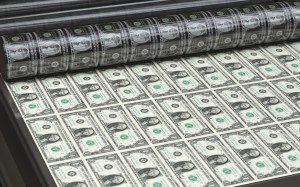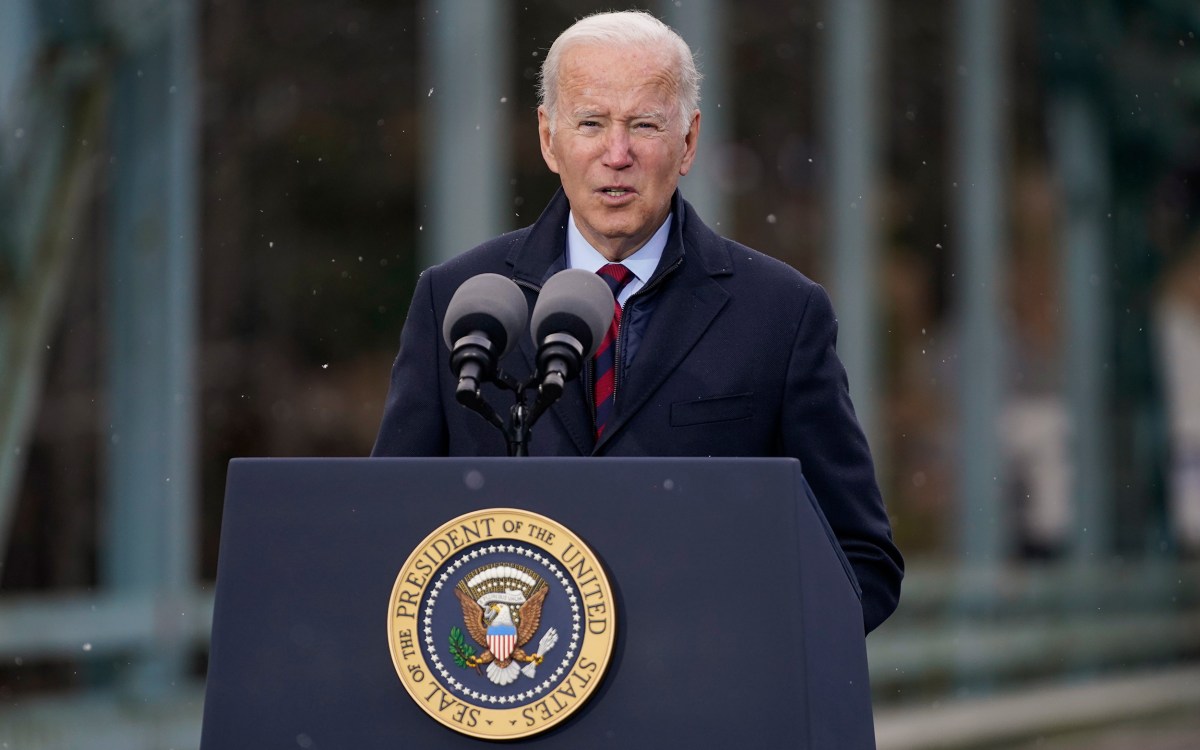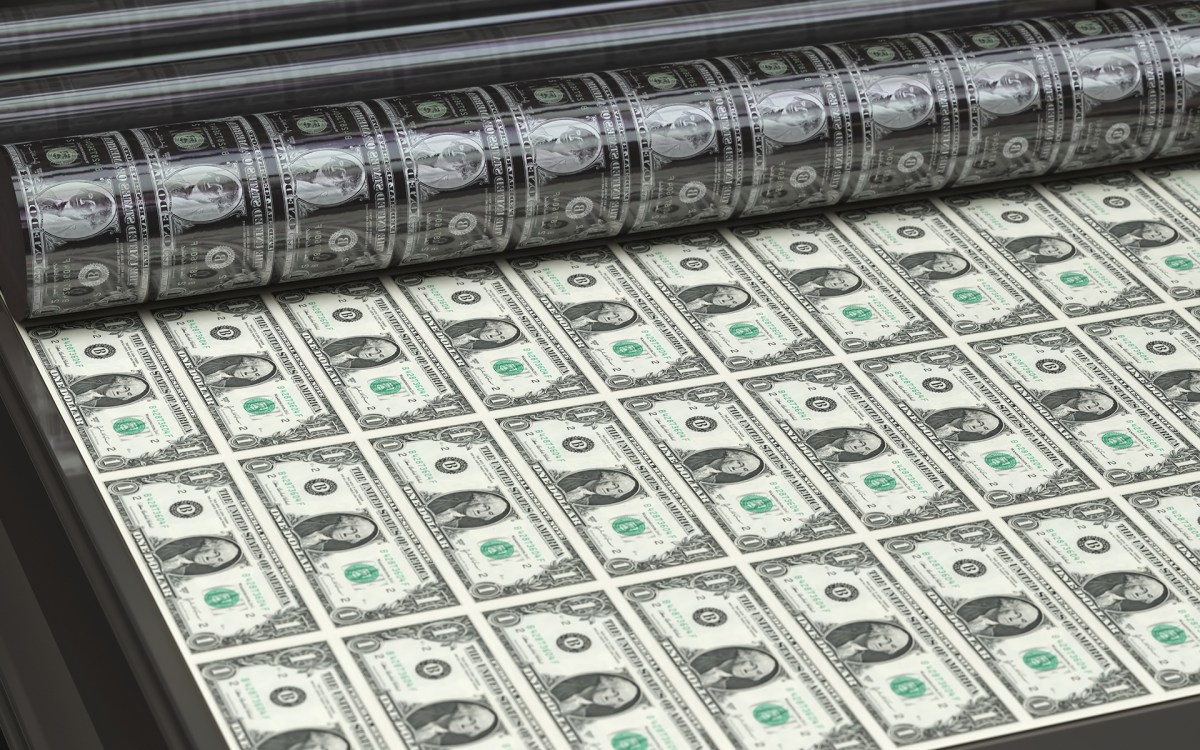Summers says pandemic only partly to blame for record inflation
Former Treasury secretary lays out need for Fed intervention, political costs of higher prices

“It’s clear that inflation is significantly contributing to distrust in the institutions and to pessimism about the future,” says former Treasury Secretary Lawrence Summers.
Courtesy of Lawrence Summers
Inflation has taken over dinner-table conversations around the nation after hitting highs not seen in four decades. Former U.S. Treasury Secretary Lawrence H. Summers, Harvard’s Charles W. Eliot University Professor, warned last February that additional government stimulus efforts to combat a pandemic slowdown raised the risk of inflation — which hit a 7 percent annual rate in December. He argued that the funds would make their way into an economy already showing signs of being on the road to recovery. Summers talked with the Gazette about the economic and political dangers of high inflation and what can be done to rein in surging prices. This interview was edited for clarity and length.
Q&A
Lawrence Summers
GAZETTE: I saw a piece in The New York Times not long ago that described this as “a strange, contradictory moment in the economy.” We have inflation at 40-year highs, people quitting jobs, supply-chain woes, yet we have unemployment nearing pre-pandemic levels and record numbers of jobs created over the last year. Do you view these signs as contradictory or do they make sense given your understanding of the forces that are at work?
SUMMERS: It’s, obviously, the pandemic. And there’s both uncertainty as to what the future of the pandemic will be and uncertainty about what the impact of the pandemic is on various aspects of the economy. So, it’s a moment of more than usual uncertainty. But I think in a certain sense, our current economic situation is relatively familiar. We have an economy that is overheating, the clearest indicator of that is the ratio of vacancies to unemployment, which is in unprecedented territory. Workers are quitting their jobs at record rates because of high-quality job opportunities, and layoffs are at extraordinarily low levels. Wherever you look, there is a shortage of workers, whether it’s restaurants, psychotherapists, or gardeners, whether it’s investment-banking analysts or medical orderlies. Labor is in short supply, putting upward pressure on wages and the inflation process. The inflation challenge is magnified by a variety of supply-chain bottlenecks ranging from automobiles that are in short supply because of limitations on semiconductor production to some categories of diet soda that are in short supply because of limits on aspartame production. So, we have a classic strong demand, limited supply inflationary situation that has developed over the last year.
GAZETTE: Is that the result of the pandemic itself versus policy responses to the pandemic versus other things?
SUMMERS: It’s two blades of a scissors. I’m not sure that we would have the inflation if there had never been a pandemic and, even if there had been a pandemic, without the overwhelming stimulus that was applied well into recovery — during 2021. We had an economy where income was running short by $50 billion a month because of the pandemic, and we injected $150 billion to $200 billion a month into that economy. It’s perhaps not surprising that that’s led to an overflow of demand, which has generated inflation that on the CPI [Consumer Price Index] measure has risen to 7 percent.
GAZETTE: Does that two-bladed effect mean that simply waiting for pandemic conditions to ease is not enough?
SUMMERS: I don’t think it will be enough. As pandemic conditions ease, probably more people will be able to go back to work, and there will be some easing of supply-chain pressures. But there will also be a greater ability to travel and more willingness of people to spend. Indeed, my colleague Jason Furman believes that we would have more inflation pressure if the Delta variant had not come along. I’m not certain that he’s right in that judgment, but to suppose that there’s some automatic relief from the pandemic ending can be quite misleading.
GAZETTE: Is inflation your biggest economic concern as opposed to other things at play — like labor market and supply-chain disruptions?
SUMMERS: It’s clear that inflation is the dominant economic problem as seen by the American people. It’s clear that inflation is significantly contributing to distrust in the institutions and to pessimism about the future. That is a terribly, terribly important thing at a time when our democratic institutions are being challenged. I think that if inflation had better been controlled, there’s a real possibility that the election of Richard Nixon in 1968 and Ronald Reagan in 1980 would not have happened. So, for those like me who are of a progressive mindset, the issues around inflation are hugely important. One can make — and we do in economics classes — an argument that inflation is like a change in units. If wages go up by 10 percent and prices go up by 10 percent, then people are in some sense in the same place in terms of purchasing power. But people don’t see it that way. They give themselves credit for the 10 percent increase in wages, and they blame the political process for the 10 percent increase in prices.
GAZETTE: There’s a perception problem. Not to negate the real effects, but that is true, really, all over the economy. The market responds to perception and emotion. Can perception sometimes cause reality?
SUMMERS: Keynes talked about how the master economist had to be capable of both great mathematical rigor and shrewd human perception and I think that’s right. Many non-economists tend to ignore the economic laws that drive phenomena like inflation, and economists have some tendency to discount the role of human psychology in shaping political and economic outcomes. I’ve always thought it was best to be eclectic in how one approached these things, but it seems very clear right now that, whatever the precise rationality and logic, the breakout of inflation over the last year has contributed to disillusionment and disappointment.
GAZETTE: The Federal Reserve Board announced an end to its bond-buying program in the coming months and the likelihood of three interest rate hikes over the coming year. Do you think that will be enough to tamp down inflation?
SUMMERS: I have been critical of the Fed for the better part of a year on its failure to recognize that inflation became, as of last spring, the most serious short-run threat facing the American economy, and I am very glad to see their policy pivot. They used to say that they were not going to raise interest rates until 2024. Now, they’re saying that there will be multiple rate increases in 2022. I think that’s all to the good. But I am rather skeptical that interest rate increases that will still leave real interest rates negative — that is, interest rates below inflation rates — will be sufficient to contain inflationary pressures. I’m not sure that the policy community has fully faced the likelihood that at least some economic slowdown will be necessary if inflation is going to be contained.
GAZETTE: That, from a political standpoint, is a difficult message.
SUMMERS: It is a difficult message. On the other hand, I think the longer we delay in being clear and strong with respect to inflation, the more costly it ultimately will be to wring inflation out of the system. We may have to deal with higher inflation the longer we delay, and we may have to deal with more entrenched inflation expectations the longer we delay.
GAZETTE: What level of interest rate increases do you think would do the trick?
SUMMERS: It’s too early to know. But historically, it has been necessary to raise interest rates by several hundred basis points — several percentage points — in order to meaningfully reduce inflation.
GAZETTE: How tricky is the balance the Fed has to strike between taming inflation and not sending the economy into recession, tapping the brakes without jamming them on?
SUMMERS: It is a very, very difficult balance and, historically, it’s one that has rarely been carried out successfully. The history is that when the unemployment rate in the United States rises by half a percentage point, it ultimately rises by more than 2 percentage points. So, bringing about a gentle tap on the brakes that slows the economy enough to substantially reduce inflation without inducing a real economic downturn and without causing significant financial instability is a quite formidable challenge.
GAZETTE: Is it possible that any anti-inflationary effects of coming out of the pandemic could ease that a little bit? It seems like we’re in an extraordinary moment.
SUMMERS: It’s possible, but as I mentioned, it’s not even clear what the impact of the pandemic was. The view that the Fed took for the first year and a half of the pandemic was that the more pandemic we had, the more stimulus we had to provide, because it created disinflationary pressure. The logic of that position is that the faster we get out of a pandemic, the more restraint we need to apply. I’m just not sure about the impact of the pandemic on inflationary pressures. But certainly I don’t think we can rely on pandemic policy to solve our problems.
GAZETTE: So there may be some salutary effects, but it could also go in the other direction.
SUMMERS: It can go in the other direction. As I indicated before, Jason Furman has argued that more pandemic means less inflation.
GAZETTE: I’ve heard concerns about a return to 1970s stagflation. Is there an era that you think would be a good analogy for what we’re going through today?
SUMMERS: I was arguing through 2021 that the right analogy was the Vietnam War period, when we used very expansionary fiscal policy, did not apply monetary restraint, and pushed inflation up very, very substantially. I think that now looks to have been a reasonable description of what happened in 2021. I am nervous about the analogy between many things that are being said today and what was said during the early and mid-1970s. People resisted the idea that inflation was being caused by loose monetary policy in favor of pointing to specific factors. People talked about oil prices, they talked about changes in ocean currents that led to changes in anchovy prices that led to changes in grain prices. They talked about a variety of structural factors, much as many economists are today. In the end, it looks like we made a mistake in the 1970s, which was failing to appreciate that ultimately, higher demand translated primarily into increased inflation.
GAZETTE: At the end of that period, a tightening of the money supply was needed, which resulted in a recession.
SUMMERS: We are not yet anywhere near where we got at the end of the Carter administration when Fed Chairman Paul Volcker had to put the economy through the wringer in order to restore normal inflation rates. And with prudent policy, there’s no reason why we need to get to that point. On the other hand, I think we need to be mindful of the fact that inflation has risen more rapidly than most people expected and is now at levels that were never reached during the Vietnam War period, and that we have considerable vulnerability — given what’s happening in Russia and in China — to further supply shocks. I think the situation can most likely be contained with nothing approaching the 1982 recession, but I think a clear recognition that inflation is our primary problem is essential if we’re to achieve that objective.
GAZETTE: What is inflation like globally, and is there a concern that this will become a global problem?
SUMMERS: Inflation has surprised on the high side almost everywhere. Inflation is more than was expected in Europe, but people who follow Europe closely now expect the European Central Bank to need to begin tightening much earlier than they previously indicated.
GAZETTE: What are your overall expectations for this year?
SUMMERS: It’s very hard to know, given the pandemic uncertainty, the geopolitical uncertainty, and the financial uncertainty, as well as all the difficulties that usually go into economic forecasting. My guess is that relative to last year, we will see growth at abnormal rates this year, perhaps in the 3 percent range. And I’m not sure that we can count on CPI inflation rate to come very far below 4 percent, though most economists are more optimistic about inflation, as they were last year.
GAZETTE: Some economists are looking at it falling below 3, aren’t they?
SUMMERS: Lots of economists are looking at inflation below 3, but I don’t think it’s very likely to happen unless there’s some kind of significant interference with economic growth.









